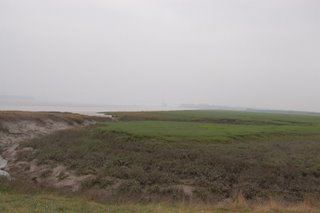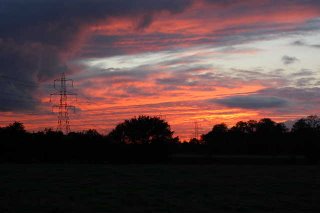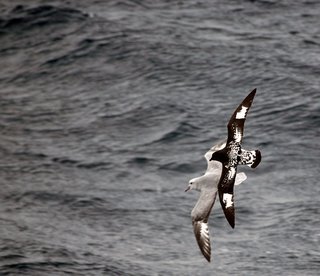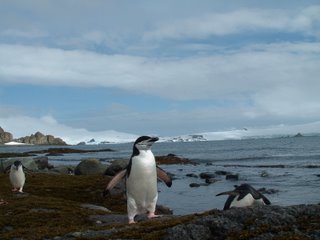 I have had a busy few days and this post is the first of at least two planned. I had marked in my calendar for Friday to go into Bristol to join in a day at the biennial Wildscreen Festival, specifically the WildPhotos symposium. I make no pretensions for being a wildlife photograher or even a good photographer, but I do want to improve my techniques and was not dissappointed with my day. I learned a great deal, was in the company of the best wildlife photographers in the world - some famous names even, and everyone was made welcome. I came away with my mind buzzing with ideas and also with the stunning images that had been projected onto the theatre screen. I doubt that I will make money with any of my photos, but at least I can aspire to make better use of my Nikon and to explore its capabilities.Here are a few more links to wonderful material that I collected during the day: -Nature Picture LibraryXpanding HorizonsARKive - Images of Life on Earth Steve BloomStaffan Widstrand - Images with an EdgeNiall Benvie - Images from the EdgeWildlife Pets Environment - ArdeaPlenty of photos to see in the links above but just one of mine - a contented bull Elephant Seal - St Andrews Bay. South Georgia - November 2005
I have had a busy few days and this post is the first of at least two planned. I had marked in my calendar for Friday to go into Bristol to join in a day at the biennial Wildscreen Festival, specifically the WildPhotos symposium. I make no pretensions for being a wildlife photograher or even a good photographer, but I do want to improve my techniques and was not dissappointed with my day. I learned a great deal, was in the company of the best wildlife photographers in the world - some famous names even, and everyone was made welcome. I came away with my mind buzzing with ideas and also with the stunning images that had been projected onto the theatre screen. I doubt that I will make money with any of my photos, but at least I can aspire to make better use of my Nikon and to explore its capabilities.Here are a few more links to wonderful material that I collected during the day: -Nature Picture LibraryXpanding HorizonsARKive - Images of Life on Earth Steve BloomStaffan Widstrand - Images with an EdgeNiall Benvie - Images from the EdgeWildlife Pets Environment - ArdeaPlenty of photos to see in the links above but just one of mine - a contented bull Elephant Seal - St Andrews Bay. South Georgia - November 2005
 Today I have been investigating one of the mysteries of bird migration. As a member of the Bristol Ornithological Club, I joined five other men on the sea wall at New Passage, just to the North of Bristol. On arrival I realised that I knew Brian the leader, as he works for the same company as myself; I had not previously known that he is a member of the BOC.The weather was clear but cloudy with some small patches of blue sky. The tide was out and there was a fair breeze. We saw many small birds, mostly flying up-river in a Northwesterly direction. I asked why this was the predominant direction and found out that no one really knows. The majority of the birds are flying South for the approaching winter, but it seems that they have flown down the West coast from Scotland and Northern England but have then turned inland, West up the Bristol Channel when they reached South Wales. The general trend though, is presumed to be South.
Today I have been investigating one of the mysteries of bird migration. As a member of the Bristol Ornithological Club, I joined five other men on the sea wall at New Passage, just to the North of Bristol. On arrival I realised that I knew Brian the leader, as he works for the same company as myself; I had not previously known that he is a member of the BOC.The weather was clear but cloudy with some small patches of blue sky. The tide was out and there was a fair breeze. We saw many small birds, mostly flying up-river in a Northwesterly direction. I asked why this was the predominant direction and found out that no one really knows. The majority of the birds are flying South for the approaching winter, but it seems that they have flown down the West coast from Scotland and Northern England but have then turned inland, West up the Bristol Channel when they reached South Wales. The general trend though, is presumed to be South.
I have been interested in watching birds for as long as I can remember but am a novice when it comes to small bird recognition. My fellow anoraks seemed much more knowledgeable and were able to name the birds from their calls or their “jizz” [size, attitude, manner of flight]. So by the end of the session and having seen thousands of birds flying overhead we had a considerable tally. The most abundant were Chaffinches, of which 2,000 must have flown over in the two hours divided up into large or small parties. Other parties of birds, or single birds that we saw on migration at New Passage were:- Siskin, Greenfinch, Redpoll, Pied and Grey Wagtail, Starling, Reed Bunting, Redwing, Meadow Pipit, Song and Mistle Thrush, Goldfinch, Brambling and Chiffchaff. So no particular rarities or surprises were seen. Now home again after an excellent little excursion, which was followed by a warming breakfast at the Motorway Services at Aust. The photo shows the distant Severn Bridge, looming out of the mist from where we were standing.
 Many congratulatuons to the Bangladeshi economist Muhammad Yunus who has been awarded the 2006 Nobel Peace Prize not for giving to the poor, but for helping them to help themselves. Here is the article from Time Magazine. It is really good news that against much opposition from right and left wings of the Bangladeshi people and initially from the Muslim establishment, his ideas have been put in place. Now many of the poor, because of these ideas, have now lifted themseles out of poverty. The whole country benefits.
Many congratulatuons to the Bangladeshi economist Muhammad Yunus who has been awarded the 2006 Nobel Peace Prize not for giving to the poor, but for helping them to help themselves. Here is the article from Time Magazine. It is really good news that against much opposition from right and left wings of the Bangladeshi people and initially from the Muslim establishment, his ideas have been put in place. Now many of the poor, because of these ideas, have now lifted themseles out of poverty. The whole country benefits.
 Sunset over Almondsbury, South Gloucestershire - Tuesday October 9th
Sunset over Almondsbury, South Gloucestershire - Tuesday October 9th
 Cataclysmic Events as reported in the October issue of Scientific American may indeed be exacerbated by mankind's poor stewardship of the Earth. New geochemical evidence is coming from the bands of stratified rock that delineate mass extinction events in the geologic record, including the exciting discovery of chemical residues, called organic biomarkers, produced by tiny life-forms that typically do not leave fossils. Together these data make it clear that cataclysmic impact as a cause of mass extinction was the exception, not the rule. In most cases, the earth itself appears to have become life's worst enemy in a previously unimagined way. And current human activities may be putting the biosphere at risk once again. How long have we got? How long have these two Cape Petrels got?
Cataclysmic Events as reported in the October issue of Scientific American may indeed be exacerbated by mankind's poor stewardship of the Earth. New geochemical evidence is coming from the bands of stratified rock that delineate mass extinction events in the geologic record, including the exciting discovery of chemical residues, called organic biomarkers, produced by tiny life-forms that typically do not leave fossils. Together these data make it clear that cataclysmic impact as a cause of mass extinction was the exception, not the rule. In most cases, the earth itself appears to have become life's worst enemy in a previously unimagined way. And current human activities may be putting the biosphere at risk once again. How long have we got? How long have these two Cape Petrels got?
All very worrying to read this in last week's New Scientist: -"Further global warming of 1 °C defines a critical threshold. Beyond that we will likely see changes that make Earth a different planet than the one we know."
So says Jim Hansen, director of NASA's Goddard Institute for Space Studies in New York. Hansen and colleagues have analysed global temperature records and found that surface temperatures have been increasing by an average of 0.2 °C every decade for the past 30 years. Warming is greatest in the high latitudes of the northern hemisphere, particularly in the sub-Arctic boreal forests of Siberia and North America. Here the melting of ice and snow is exposing darker surfaces that absorb more sunlight and increase warming, creating a positive feedback.
Earth is already as warm as at any time in the last 10,000 years, and is within 1 °C of being its hottest for a million years, says Hansen's team. Another decade of business-as-usual carbon emissions will probably make it too late to prevent the ecosystems of the north from triggering runaway climate change, the study concludes (Proceedings of the National Academy of Sciences, vol 103, p 14288).
 Chinstrap penguins (Pygoscelis antarctica)My personal favourite! Just 10 months ago I was sitting on a rock admiring the view when this little fellow came out of the sea and waddled past me on his way to the nest. Aitcho Islands - Antarctic Peninsula.
Chinstrap penguins (Pygoscelis antarctica)My personal favourite! Just 10 months ago I was sitting on a rock admiring the view when this little fellow came out of the sea and waddled past me on his way to the nest. Aitcho Islands - Antarctic Peninsula.
One of my friends has sent me the Simon and Garfunkel song El Condor pasa, it means much and connects with the general theme of my blog.I'd rather be a sparrow than a snail.Yes I would.If I could,I surely would.I'd rather be a hammer than a nail.Yes I would.If I only could,I surely would.CHORUSAway, I'd rather sail awayLike a swan that's here and goneA man gets tied up to the groundHe gives the worldIts saddest sound,Its saddest sound.I'd rather be a forest than a street.Yes I would.If I could,I surely would.I'd rather feel the earth beneath my feet,Yes I would.If I only could,I surely would.






